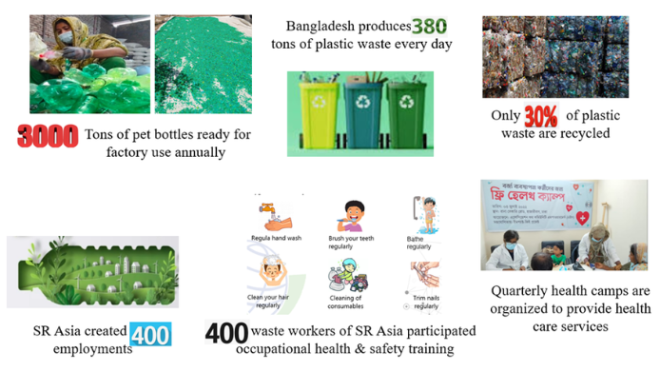Empowering sustainable entrepreneurship through Waste Bank Programme
Empowering sustainable entrepreneurship through Waste Bank Programme

SR Asia Bangladesh and the Coca-Cola Foundation have jointly launched the Integrated Management of Plastic Assortment and Contribution towards Green Economy (IMPACT-GE) project, a three-year initiative running from 2022 to 2025.
The project aims to revolutionise plastic waste management in Bangladesh while fostering sustainable livelihoods and entrepreneurship in local communities.
Bangladesh produces approximately 380 tonnes of plastic waste daily, with only about 30% currently being recycled.
To promote plastic recycling, the Government of Bangladesh has designated it as a priority sector under the National Industrial Policy of 2016.
The government offers incentives such as reduced corporate income tax (CIT) for 5 to 10 years, depending on the location, for newly established plastic recycling businesses, along with lower import duties on raw materials and exemptions on capital machinery.
SR Asia is collaborating with the Coca-Cola Foundation and BRAC on several recycling projects to develop sustainable environmental entrepreneurs. By providing awareness training to community members on the principles of reducing, reusing, and recycling, SR Asia is also supporting the development of plastic recycling businesses.
Under the IMPACT-GE project, SR Asia has already established a recycling plant and five collection centres in Dhaka, employing more than 400 waste workers. These plants not only reduce environmental pollution, but they also help to establish a green economy by converting waste into a useful resource. To encourage community recycling and engagement in green projects, SR Asia established the Waste Bank Programme, which encourages active participation in sustainable waste management.
Turning trash into treasure
The Waste Bank operates as a centre for recycling where community members can deposit plastic waste in exchange for rewards.
Residents, especially from underprivileged areas, are encouraged to collect and sort plastic waste, which can then be traded for cash.
By fostering a circular economy, the programme encourages waste reduction and recycling while promoting eco-friendly practices.
The daily contributions of each member’s plastic waste are tracked in a waste ledger. A portion of the profits is given to the depositors at the end of every six months, with a percentage determined by their total deposits. This system provides twofold benefits: members receive a fair price for their daily waste deposits and also earn a portion of the monthly profits.
“This initiative is changing the way we view waste,” remarked Sumaya Rashid, SR Asia’s Country Director. “Through community involvement and the transformation of waste into a valuable resource, we are fostering a sustainability-driven mindset while empowering individuals to build careers as environmental entrepreneurs.”
Fostering Sustainable Environmental Entrepreneurship
The Waste Bank initiative is not just about waste collection—it is a catalyst for entrepreneurship. Local participants, especially informal waste collectors, are being trained to establish small-scale waste management businesses.
By selling recycled plastic materials to manufacturers or using them to create new products, these entrepreneurs are contributing to a growing green economy. The factory workers are also given training on safety and preventive health care measures.
Additionally, health camps are regularly organised to safeguard them from potential illnesses and injuries associated with hazardous waste collection.
The programme connects with Bangladesh’s broader goals of reaching the United Nations’ Sustainable Development Goals (SDGs), including SDG 12: Responsible Consumption and Production and SDG 13: Climate Action.
Scaling for Impact
The success of the Waste Bank is being viewed as a model for national expansion. SR Asia also provides advisory support to establish recycling plants, with the goal of building a nationwide network of community-driven waste banks.
For more information on the Waste Bank Programme or to get involved, visit SR Asia’s website or contact local community centres for details on how to participate.


